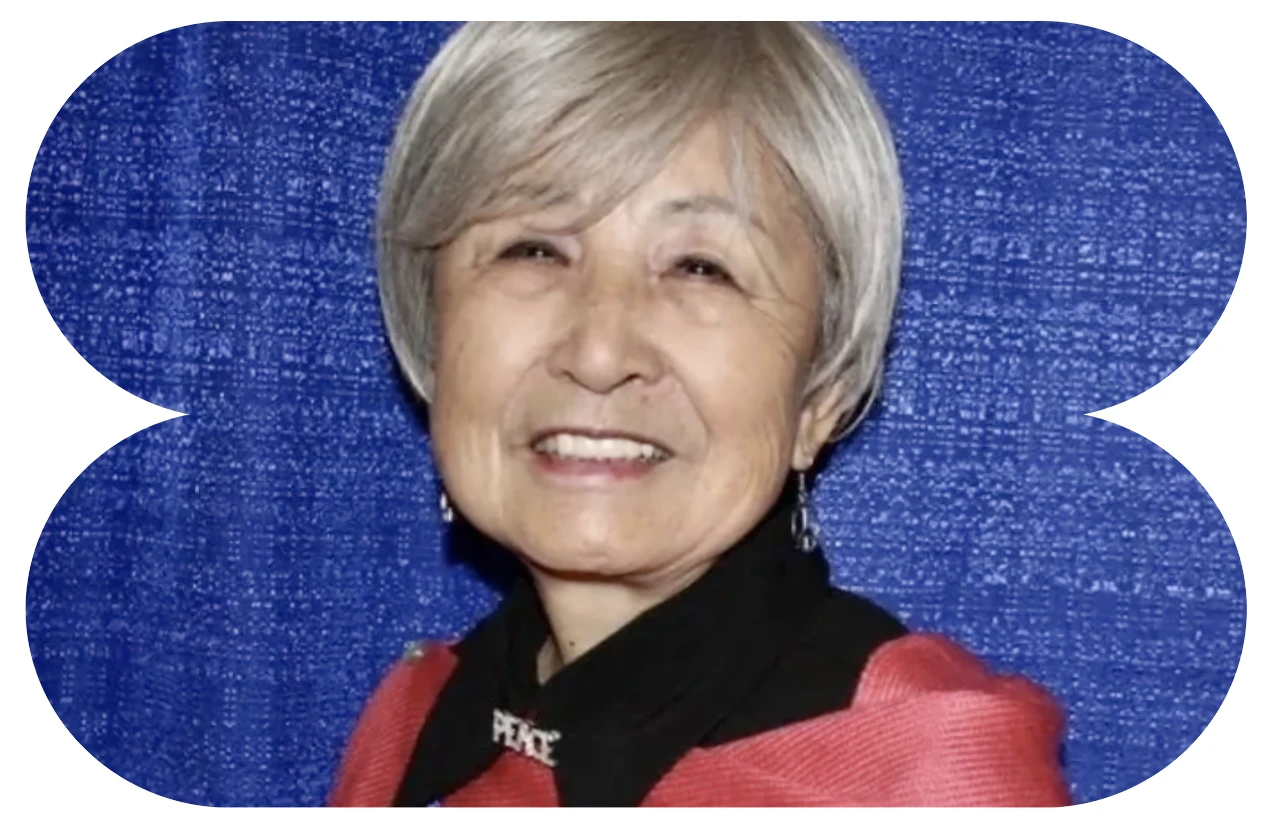
16 Peace, Justice and Strong Institutions (31)
Promote peaceful and inclusive societies for sustainable development, provide access to justice for all and build effective, accountable and inclusive institutions at all levels
Bearing witness: Walk for disarmament and lantern ceremony

80th Anniversary events organized by the Oak Ridge Environmental Peace Alliance
Rally and walk action for disarmament
Saturday, August 9 | 10:00 a.m.
Gather at Bissell Park in Oak Ridge.
Join the walk to the gates of Y-12 for a rally with music, street theater and calls for nuclear disarmament.
Lantern Ceremony along the Tennessee River
Saturday, August 9 | 8:00 p.m.
Sequoyah Hills Park in Knoxville
Close the week with a reflective lantern ceremony along the water — honoring the lives lost and our continued commitment to peace.
Visit the OREPA website for details and more events.
Bearing witness to Hiroshima

80th Anniversary events organized by the Oak Ridge Environmental Peace Alliance
Moving personal accounts of time spent in Hiroshima
Friday, August 8 | 6:00–8:00 PM
First Presbyterian Church Knoxville
First, readings from hibakusha Hideko Tamura Snider’s book “One Sunny Day: Childhood Memories of Hiroshima.” Then, Utsumi Gyoshu, Rachel Stewart and author Emily Strasser will each give remarks about recent experiences in Hiroshima. Q&A will follow.
Visit the OREPA website for details and more events.
Bearing witness: The Vow from Hiroshima

80th Anniversary events organized by the Oak Ridge Environmental Peace Alliance
Film Screening: The Vow from Hiroshima
Thursday, August 7 | 6:00–8:00 PM
Central Cinema (TBC)
Join us for a powerful documentary followed by a conversation with co-producer/writer, Mitchie and discussion led by Ed Sullivan.
Visit the OREPA website for details and more events.
 Mitchie Takeuchi answering questions from the audience at Central Cinema on August 7. Wolf Naegeli/Hellbender Press
Mitchie Takeuchi answering questions from the audience at Central Cinema on August 7. Wolf Naegeli/Hellbender Press
Screening of the feature-length documentary with Mitchie Takeuchi at Knoxville’s Central Cinema
Knoxville — As part of its Bearing Witness program to commemorate the 80th anniversary of the Hiroshima and Nagasaki atom bombings, the Oak Ridge Environmental Peace Alliance (OREPA) organized a viewing of The Vow from Hiroshima and conversation with its co-producer/writer Mitchie Takeuchi. Takeuchi is a second generation ‘hibakusha,’ the Japanese word for atom bomb survivors. Her father, Dr. Ken Takeuchi, was a military surgeon and founding president of Hiroshima’s Red Cross Hospital from 1937 to 1947. He was at the hospital and badly wounded, but survived.
The film follows the story of Setsuko Thurlow, who was 13 when she barely managed to crawl out from the rubble of her school before it was overwhelmed by the fire that burned most of her schoolmates alive. Setsuko became the foremost international proponent for the abolition of nuclear weapons. She was part of the International Campaign to Abolish Nuclear Weapons’ delegation that received the 2017 Nobel Peace Price in Oslo. In her acceptance speech, she said:

A 52-minute short version of The Vow from Hiroshima can be watched on PBS.
Bearing witness: Peace Pilgrimage, Names and Remembrance ceremony

80th Anniversary events organized by the Oak Ridge Environmental Peace Alliance
Peace pilgrimage from the Great Smoky Mountains
Peace Walk: Bearing Witness to Hiroshima, August 4–9, 2025
Names and remembrance ceremony
Wednesday, August 6 | 6:00–9:00 a.m.
Location: Across from the Y-12 Security Complex main entrance way in Oak Rige
Join us to honor the victims of Hiroshima with a morning of names and remembrance, bell ringing and a visual tribute of paper cranes; please be sure to bring a chair.
Photo Lecture & Artist Panel
Wednesday, August 6 | 6:30 p.m.
Addison’s Bookstore, 126 S. Gay Street, Knoxville
An evening with Yvonne Dalschen, Black Atticus and guest artists reflecting on the legacy of Hiroshima through art, storytelling and music.
Visit the OREPA website for details and more events.
Bearing witness: Hiroshima, Nagasaki and the end of nuclear weapons
Join us for the first 80th Anniversary event organized by the Oak Ridge Environmental Peace Alliance
First Friday at the Birdhouse — August 1, 5:30-7:30 p.m.
Birdhouse Neighborhood Center, 800 N 4th Ave, Knoxville, TN 37917
This casual OREPA gathering for a special First Friday sneak peek of Yvonne Dalschen’s photo exhibit will include light refreshments and an opportunity to engage with powerful images exploring themes of peace and resistance. All are welcome!
Editorial: I’m from Oak Ridge. Federal cuts threaten my career as a scientist.
Written by Sarah Nelson Sarah Nelson stands with a copy of The Journal of Undergraduate Research, which ran her first scientific publication in 2003. It was researched during her time as an intern at Oak Ridge National Laboratory. Nelson is now a senior research scientist. Derek Armstrong via BlueSky
Sarah Nelson stands with a copy of The Journal of Undergraduate Research, which ran her first scientific publication in 2003. It was researched during her time as an intern at Oak Ridge National Laboratory. Nelson is now a senior research scientist. Derek Armstrong via BlueSky
Federal science cuts, in Oak Ridge and beyond, threaten American health and innovation
Sarah Nelson, MPH, PhD, is a senior research scientist in Seattle studying the genetic causes of complex health conditions. Hellbender Press has previously reported on changes to Oak Ridge federal facilities since the start of the second Trump Administration. This op-ed was originally published by KnoxNews.
OAK RIDGE — My mother has been cleaning out the attic in her Oak Ridge house and very reasonably decided my sisters and I should become the stewards of the memorabilia from our childhoods and early adulthoods. The box she recently mailed me included my first scientific publication, from my undergraduate summer internship at the Oak Ridge National Laboratory Mammalian Genetics Section (the “Mouse House”) in 2002.
Over 20 years later, I am a senior research scientist and author on 60+ scientific publications mostly related to understanding how genetic variation contributes to different human diseases.
Even before I received that box in the mail, I had been reflecting on why I chose a career in scientific research — mainly because, since January, I am no longer sure if and how I will be able to continue pursuing it. Federally funded scientific research is being attacked and dismantled by the administration of President Donald Trump, threatening the entire scientific enterprise. The situation is dire, and I urge you to join me in staying informed and speaking out against these existential threats to science.
Hit Knoxville’s wild side and celebrate the city’s great outdoors
Written by OutlandishAF This seemingly primeval scene is actually within the city limits of Knoxville at Ijams Nature Center. The popular park is part of the Urban Wilderness and will be home to the Outlandish Adventure Festival set for May 2-3. Thomas Fraser/Hellbender Press
This seemingly primeval scene is actually within the city limits of Knoxville at Ijams Nature Center. The popular park is part of the Urban Wilderness and will be home to the Outlandish Adventure Festival set for May 2-3. Thomas Fraser/Hellbender Press
Outlandish Adventure Festival’s celebrations of the outdoors include climbing competitions, SUP races, guided hikes and yoga
KNOXVILLE — The city’s great outdoors is calling — and the Outlandish Adventure Festival is answering with two days packed full of adrenaline-pumping fun, scenic exploration and unforgettable experiences. Set for May 2-3 at Ijams Nature Center, this action-packed celebration of the region’s rivers, rocks, and trails invites adventurers of all levels to get outside and play.
The Outlandish Adventure Festival is a collaborative effort by the area’s rich collection of outdoor enthusiasts and organizations, including Visit Knoxville, Ijams, Knoxville’s Urban Wilderness, AMBC, Knoxville Adventure Collective, River Sports Outfitters, The Maker City, Legacy Parks and The City of Knoxville. They’ve created a weekend to inspire exploration, connection, adventure and celebration of Knoxville’s natural beauty.
- outlandish adventure festival
- knoxville outdoor activities for kid
- ijams activity
- ijams nature center
- ijams festival
- things to do in knoxville in may
- paddlesports knoxville
- knoxville outdoor activities
- spring festivals in knoxville
- knoxville’s urban wilderness
- knoxville mountain biking
- ambc
- knoxville yoga outside
- vick dyer realtor
- ole smoky distillery
First UT sustainability symposium offers a collaborative vision for the future
Written by Lucas Hunter
All great scientific solutions start with collaboration
KNOXVILLE — The challenges facing the planet and its inhabitants have long been too complex for any one individual or group to address, and that’s why the great advancements in modern science begin with conferences, symposiums and collaboration.
The first Environmental Future Symposium is an effort from the University of Tennessee Office of Sustainability to present a vision of the future for area residents and University of Tennessee students.
Planned for the Agriculture and Natural Resources Ballroom and Plaza from 2 p.m. to 6 p.m. March 27, the symposium is spearheaded by the office’s Alternative Energy and Transportation Coordinator Ben Gouffon. His vision for the event is simple: at the intersection of human-accelerated climate destabilization and a revitalization of the collapsing biosphere sits every individual and their actions. His hope is that this symposium is an avenue for every attendee to discover what they can do for Knoxville, the university and the planet they call home.
Updated 4/18: Smoky gray: Former Smokies leader warns of more funding cuts; popular campsites remain closed; still little information on cuts at Great Smoky Mountains National Park
Written by Elan Young, Ben Pounds and Thomas Fraser Campers are seen enjoying a morning at Elkmont Campground in Great Smoky Mountains National Park. Elkmont is one of the Smokies campgrounds still open. National Park Service
Campers are seen enjoying a morning at Elkmont Campground in Great Smoky Mountains National Park. Elkmont is one of the Smokies campgrounds still open. National Park Service
National parks advocate and former Smokies official warns of funding shortfalls as closures continue, concerns persist, and people resist
KNOXVILLE — Funding for national parks has never amounted to much, and the federal government will cut even more if people don’t speak out in defense of the country’s natural and ecological crown jewels.
That was the message from Phil Francis, chairman of the Coalition to Protect American National Parks and former acting superintendent of Great Smoky Mountains National Park. He spoke to an audience at Knoxville’s Schulz Bräu Brewing Company hosted by Discover Life in America. Francis said that due to rising concerns his organization grew from 500 members to over 4,000 during the Trump administration. The coalition, he said, includes many people like himself who used to work for the park system, including the former superintendent of Acadia National Park.
Francis advocated that others should lobby government officials to continue to support the parks.
“If you don’t speak up, it makes it a lot more difficult,” he told the audience.
- elan young
- smokies job cuts
- federal job cuts
- rangers
- smokies rangers fired
- how many lost jobs at smokies
- smokies parking fees
- great smoky mountains economic impact
- national parks conservation association
- association of national park rangers
- hellbender press reporting on job cuts
- probationary workers fired
- great smoky mountains national park
- big south fork national river and recreation area
- maintenance backlog
- jeff hunter
- bill wade
- cades cove loop road
- carfree experience in cades cove
- carfree wednesdays in cades cove
- garry shores
- townsend
- townsend protest
- gatlinburg protest
- phil francis
- discover life in america
- ben pounds
- national park funding
- trump national park cuts
More...
Stand in the Middle at McClung Museum
 Clint Carroll, a citizen of the Cherokee Nation, will talk Feb. 27 at McClung Museum about the Cherokee philosophy of the ‘Middle Way.’
Clint Carroll, a citizen of the Cherokee Nation, will talk Feb. 27 at McClung Museum about the Cherokee philosophy of the ‘Middle Way.’
KNOXVILLE — A central aspect of Cherokee worldview is ᎠᏰᎵ ᎦᏙᎬ (ayehli gadogv), or “Standing in the Middle,” a philosophy that humans occupy a role in a web of complex interactions between mutually dependent organisms. Standing in the Middle emphasizes the importance of balance and reciprocity in persisting relationships.
A lecture at 4:30 p.m. Feb. 27 at McClung Museum, 1327 Circle Park, Knoxville, will feature Dr. Clint Carroll, who will explore how Standing in the Middle informs ecology, conservation, management practices, epistemology and science communication in the face of unprecedented anthropogenic (human-caused) change.
Light refreshments will be available before the lecture.
Clint Carroll is associate professor of Ethnic Studies at the University of Colorado Boulder. A citizen of the Cherokee Nation, he works closely with Cherokee people in Oklahoma on issues of land conservation and the perpetuation of land-based knowledge and ways of life.
She taught us to “fight with purpose, and love without constraint:” Nikki Giovanni, literary icon and civil rights activist, dies at 81 in Blacksburg
Written by Angela Dennis Renowned poet, educator and civil rights activist Nikki Giovanni died Dec. 9 at 81. Jeanine Fuller/Social media
Renowned poet, educator and civil rights activist Nikki Giovanni died Dec. 9 at 81. Jeanine Fuller/Social media
“Knoxville, Tennessee”
I always like summer
best
you can eat fresh corn
from daddy's garden
and okra
and greens
and cabbage
and lots of
barbecue
and buttermilk
and homemade ice-cream
at the church picnic
and listen to
gospel music
outside
at the church
homecoming
and you go to the mountains with
your grandmother
and go barefooted
and be warm
all the time
not only when you go to bed
and sleep
— Nikki Giovanni
BLACKSBURG — Knoxville native Nikki Giovanni, a poet, civil rights legend and educator who empowered generations with her fearless words and unwavering advocacy for Black America, died on Dec. 9 at the age of 81 after her third cancer diagnosis.
“The acclaimed poet, Black Arts Movement icon whose poems of wit, wonder and wisdom were celebrated in children’s books, on keynote stages and television shows, and in more than two dozen bestselling poetry collections, died peacefully on December 9, 2024, with her life-long partner, Virginia [Ginney] Fowler, by her side,” said friend and author Renee Watson in a statement.
In 2023, Knoxville’s Beck Cultural Exchange Center unveiled an exhibit dedicated to Giovanni, featuring her complete book collection and personal memorabilia. The center, a cherished space for Giovanni, was a must-visit whenever she returned to her hometown.
“Nikki was a gift to the world, generously sharing her talents with everyone around her,” said Rev. Reneé Kesler, President of the Beck Cultural Exchange Center. She loved deeply and expressed that love in countless ways.”
Yolande Cornelia “Nikki” Giovanni was born on June 7, 1943, in the “Negro Wing” of Knoxville General Hospital to parents Yolande Cornelia Sr. and Jones “Gus” Giovanni. She graduated from Austin High School in 1961.
She enrolled at the historically Black Fisk University in Nashville in 1960. At Fisk, she joined the Writer’s Workshop, a space that fostered her creativity and connected her with other aspiring Black writers who later went on to become prominent Black literary figures such as Dudley Randall, Margaret Walker and Amiri Baraka.
“At Fisk, she found her voice — a voice that would go on to inspire the world to dream with courage, to fight with purpose and to love without constraint. Through her poetry, she wove stories of Black resilience, beauty and liberation. Her spirit is forever etched into the soul at Fisk, an eternal light guiding us toward justice, creativity and authenticity,” Fisk officials said in a statement.
Photos: Glimpses of the old ways at Cherokee Fall Festival in Vonore
Written by Thomas Fraser Scenes from the Cherokee Fall Festival, an annual celebration of Cherokee culture and history at the Sequoyah Museum in Vonore. Photos by Thomas Fraser/Hellbender Press
Scenes from the Cherokee Fall Festival, an annual celebration of Cherokee culture and history at the Sequoyah Museum in Vonore. Photos by Thomas Fraser/Hellbender Press
A celebration of Cherokee people and the man who wrote their alphabet
VONORE — Flutes, dance, food and firearms were featured at the annual festival near the birthplace of a linguistic giant on the shore of the Little Tennessee River and the grounds of the Sequoyah Museum.
Cherokee dance, lore and storytelling communicated the rich story of the Native American nation, which was forcibly disbanded along with other indigenous residents of the Southern Appalachians under the administration of President Andrew Jackson. The main concentration of the tribe is now in Oklahoma, but the Eastern Band of Cherokee Indians — including those whose ancestors resisted forced relocation — is now centered in Cherokee.
Sequoyah, born in nearby Toskegee in the Cherokee Nation circa 1770, developed an alphabet for the Cherokee language so it could be written and read, an astonishing feat to this day. By some accounts, the literacy rate of the then-fractured nation approached 100 percent soon after Sequoyah’s death in Mexico in 1843.
Most of Sequoyah’s community was destroyed and its culture imperiled by the invasion of the nation by federal forces after the sham Treaty of New Echota, named after the then-capital of the Cherokee Nation in north Georgia. The Cherokee and other regional tribes were rounded up in the late 1830s during an Army campaign under the command of Gen. Winfield Scott and forced upon the Trail of Tears.

Pending state conservation deal would protect forest and water resources
Written by Cassandra Stephenson A man paddles down the main stem of the Wolf River in West Tennessee. The state is working to purchase 5,477 acres of forest land near Grand Junction from the Hobart Ames Foundation. The land is part of the Wolf River watershed. Wolf River Conservancy
A man paddles down the main stem of the Wolf River in West Tennessee. The state is working to purchase 5,477 acres of forest land near Grand Junction from the Hobart Ames Foundation. The land is part of the Wolf River watershed. Wolf River Conservancy
The roughly 5,500-acre property features wetland forest used for research by the University of Tennessee
This article was originally published by Tennessee Lookout.
GRAND JUNCTION — About 60 miles east of Memphis near the Mississippi line, verdant hardwood trees and ecologically exceptional streams weave through thousands of acres of rolling hills.
The land is home to a diverse array of aquatic and terrestrial life, decades-old archaeological sites and a watershed that feeds into the aquifer where hundreds of thousands of Memphians source their drinking water.
If all goes to plan, 5,477 acres of this land will soon become Tennessee’s newest state forest, securing its preservation for posterity.
The land is a portion of the 18,400-acre historic Ames Plantation, a privately owned tract in Fayette and Hardeman Counties amassed by Massachusetts industrialist Hobart Ames in the early 1900s.
- memphis aquifer
- memphis drinking water
- land conservation
- west tennessee land preservation
- drinking water protections
- cassandra stephenson
- tennessee lookout
- conservation fund
- ames plantation
- wolf river
- wolf river conservancy
- ut ag research
- hobart ames foundation
- tennessee state forests
- state forests in tn
- grand junction, tennessee
- ford blue oval
- heritage conservation trust
- forest service legacy program
